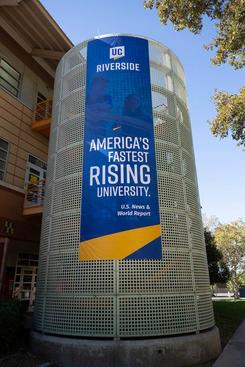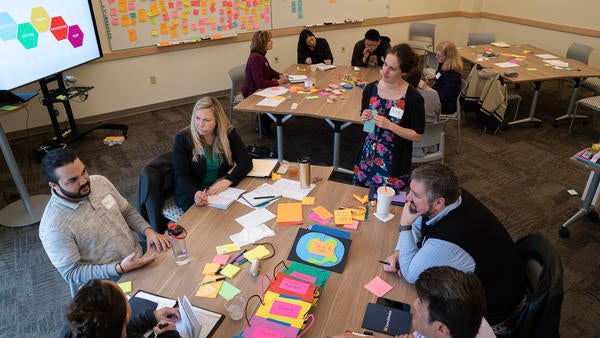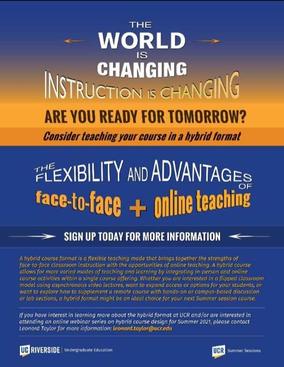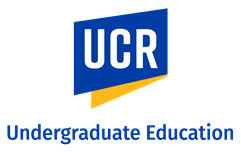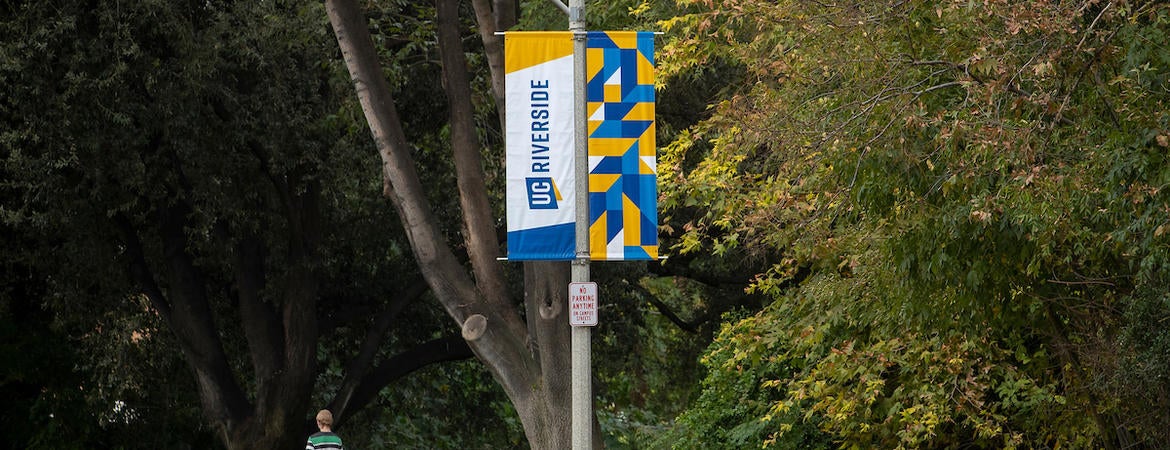
A Message from the Vice Provost and Dean of Undergraduate Education
January 2021
Dear UCR Community,
As I watched the violence at the Capitol on January 6th, I immediately began to process what occurred that day and began to reflect on the state of the nation, the COVID-19 pandemic, and the murder of George Floyd and many others. In the past year, the “normalcy” of our everyday lives has been uprooted and our resiliency continues to be tested. There are still biases and differences that show up within the workplace and outside of the UCR community. Maslow’s Hierarchy of Needs says that safety is one of our foundational and most basic needs. The pandemic, BLM, and now the circumstances for the events at the Capitol have tested what is known to many as the basic human need for all people to feel safe. I sympathize with those who feel unsafe and as a community, I am hopeful that we will come together and support one another.
UCR is proud to share that we are number one in the country for social mobility. Our student demographic is majority low-income and first-generation. Our campus community must remember the challenges that our students face as they focus on college, higher education, freedom of speech, and freedom of thought. A sense of belonging for our students, our staff, and those who affiliate with the UCR community are important for inclusiveness and an environment where we can all thrive. It is the key to remaining number one in social mobility. Our campus community must remain nimble to help our students as they work through this difficult and unprecedented time. The already existing uncertainties of understanding the college process are compounded by world-changing events that are re-shaping what it means to feel stable and safe.
I hope that our campus partners and others dedicated to the UCR student population can take time to reflect on what is needed from and for our students at this time and speak up if needed to ensure inclusiveness. After all, we are all in this together; navigating an uncharted world. Thank you to everyone who is doing the work to keep our students supported and who help to amplify their voices.
Undergraduate Education continues to work across campus to empower our UCR community in reaching its full potential. Below you will find great stories and useful information about our work and partnerships for promoting academic excellence, social connection, and mental health. I also want to highlight a new partnership with the LGBT Resource Center starting in winter term: a series of COVID-19 Conversation Circles every Tuesday from 2 – 3 PM. Please join us in this opportunity for all members of our community – students, faculty, and staff – to build support and understanding through these unprecedented times.
Jennifer Brown, Ph.D.
Vice Provost and Dean of Undergraduate Education
Academic Excellence
December 2020 marked the end of the University Innovation Alliance's (UIA) Bridging the Gap from Education to Employment project, a three-year initiative to improve career outcomes for first-generation and low-income students. Over the past few years, a committed team of Career Center staff, Associate Deans, Faculty, leaders from Undergraduate Education and Student Affairs, and UCR student interns met monthly to understand our students’ needs on their career path and generate advanced solutions. After interviewing over 160 students and considering a wide range of ideas, the team developed an innovative paid internship program where students would work in a group and solve a real-world problem for an employer.
In summer 2020, despite many challenges and surprises brought by COVID-19, the program became a reality. UCR partnered with the U.S. Environmental Protection Agency (EPA) to pilot the program model and for six weeks, six UCR undergraduates worked collaboratively to recommend food waste reduction strategies for UCR. Students received professional development from the Career Center, exposure to high-level EPA leaders during weekly guest speakers, mentorship from UCR faculty and graduate students and EPA staff; and the chance to attend a virtual EPA conference. The internship created a sense of community for students, opened up a new world of career goals and opportunities, and built their confidence.
Program data from pre-and post-program surveys show the internship was transformational for the following reasons: students recognized value in building relationships, students gained confidence in public speaking, internship experiences were built on the development of National Associate of Colleges and Employers (NACE) career readiness competencies, interns increased their ability to explore and plan their career paths, and students contributed directly to the UCR community. Employers identified several factors that made this program successful through a post-program evaluation including the ability to provide an active role in fostering students towards their career path. To hear about the impact of the program directly from student participants, please watch this video.
Based on the success of the pilot program, the UIA is providing additional funding to expand and improve this project in 2021. The Career Center will be leading the BGEE project team to repeat and expand the internship program in summer 2021. Stay tuned for exciting new developments in the new year! Alexandra Lozanoff, the University Innovation Alliance Fellow who supported UC Riverside as well as Oregon State and Arizona State, through the BGEE project shares her greatest learning from her two years with the project here.
For more information, please contact Elizabeth Montgomery, Associate Director, Student & College Engagement at the Career Center at elizabeth.montgomery@ucr.edu.
Summer Sessions
Last summer, Summer Sessions partnered with the XCITE team to provide online tools and techniques to summer instructors. Following up on faculty feedback and building on lessons learned from remote teaching, Summer Sessions and XCITE are supporting faculty in developing hybrid courses for summer 2021. A hybrid course combines face-to-face instruction with online learning activities. Please contact leonard.taylor@ucr.edu if you are interested in learning about the hybrid format at UCR or would like to attend an online webinar series on hybrid course design for summer 2021.
New Reading Support
Prior to COVID-19, the Academic Resource Center (ARC) increased its focus on college reading practices for undergraduate students and began offering-reading focused workshops. Since COVID-19 and UCR's move to online learning environments, the ARC has continued to develop online reading resources for students. The new Reading Support Program provides specialized instruction and support for developing reading practices that play essential roles in academic communication, such as previewing, reading, summarizing, & reviewing.
The program also helps students explore strategies for approaching specialized texts—including identifying disciplinary differences—by focusing on research and scholarly articles. Students will also learn to identify vocabulary-building techniques to strengthen their reading comprehension. The focus on rhetorical and metacognitive reading practices can assist students in refining their critical reading practices. The program provides students with workshops and individualized consultations that will take place via Zoom until the campus reopens. For workshop offerings, additional resources, and how to make appointments during winter 2021 please visit the Reading Support Program’s webpage. Please contact Jay Spencer (Joseph.Spencer@ucr.edu) if you have additional questions.
Learn About Other Academic Support
Writing and Foster Youth Alliance
Founded in 2018 by Dr. Rory Moore and Dr. Paul Beehler and housed in the University Writing Program (UWP), the Writing and Foster Youth Alliance (WAFYA) is an organization designed to provide supplemental writing instruction to UCR’s current and former foster youth. Volunteer faculty from the UWP organize and participate in writing labs, study halls, therapeutic writing activities, and formal lectures and workshops on composition. The core of the program is one-on-one tutoring which can lead to sustained mentoring relationships between faculty members and students in the foster youth community. WAFYA and its dedicated faculty are committed to seeing the foster youth of UCR thrive in higher education.
Learning Technology Updates
Slack
In an effort to keep the campus community engaged through the campus closure, UCR is rolling out the Slack collaboration platform. This winter, Slack will be available for incoming freshmen and transfer students through Highlander Connections and the Campus Collective (previously Freshman Collective). Slack expands the ability of UCR students, faculty, and staff to engage in a greater variety of online social interactions and collaborations. More than just a means of communication, Slack helps build and sustain virtual communities of all kinds during this time of remote teaching and learning. Along with Canvas as our new LMS and YuJa as our new video solution, Slack is a key part of UCR’s new educational technology ecosystem.
Slack will be available, upon request, to the campus community as early as March. Faculty, advisors, departments, and special interest groups will be able to request Slack workspaces to support specific group communication and collaboration needs. Current Slack users will be able to migrate to the enterprise version this Spring. More information on Slack or how to request a Slack workspace is available here. Please contact Israel Fletes (israel.fletes@ucr.edu) if you have additional questions.
Canvas
As part of an ongoing effort to provide faculty and students access to the latest educational technologies and platforms for teaching and learning, UCR is getting ready for the next digital learning environment. Over the past several years there has been an increase in requests for a new learning management system (LMS) that meets UCR’s current and future needs. UCR faculty have been piloting Canvas since Summer Session II 2020 and the feedback has been overwhelmingly positive. During the winter and spring 2021 terms, there is an expanded pilot for faculty interested in making the move. The formal transition year begins fall 2021, where XCITE will work to ensure all departments and faculty are ready to migrate to Canvas before June 2022 (when iLearn will be retired). Training and support are available for faculty to migrate course content to Canvas. In addition to XCITE support, Canvas technical support will be available 24/7 via live chat and email. Please visit Keep Teaching for additional details and important dates.
Academy of Distinguished Teaching
The members of the Academy of Distinguished Teaching understand that the continuation of online instruction in fall 2020 posed many challenges for classroom instructors across campus. ADT's mission of fostering excellence in teaching is more critical now than ever before. In early October, the ADT teamed with the staff from XCITE to host a campus town hall devoted to online instruction and started holding weekly faculty office hours and "pandemic teaching happy hours." Anyone interested in attending these informal sessions can sign up on the ADT home page.
In December, the ADT conducted a hands-on workshop for online instruction. Topics included how to facilitate active learning, student discussion, collaborative learning during live synchronous classes, best-practices for creating and curating asynchronous learning materials, and how to efficiently grade open-ended exams and writing assignments. Visit the ADT for workshop demos of the event.
The ADT will continue to partner with XCITE on additional workshops and events devoted to improving classroom instruction. In mid-winter quarter the ADT will begin soliciting nominations for the 2020-21 Innovative Teaching and Junior Excellence in Teaching (JET) Awards. Awardees will be recognized at the annual Celebration of Teaching event at the end of the spring 2021 quarter (date and time TBA).
Social Connection
The UCR Campus Collective helps connect incoming freshmen and transfer students with a peer mentor who is a continuing UCR student. Mentors help create a sense of community and offer guidance on how to help their mentees acclimate to life in college. Peers connect via text messaging, making it easy and accessible, and reducing computer screen time. Utilizing the Mentor Collective platform, volunteers receive training, matching support, notes and resource referrals, conversation starters, conversation nudges, and robust analytics to help keep peer to peer connections strong throughout the academic year.
Based on fall 2020 data, the program is a strong success. At the end of the fall quarter, over 1,780 freshmen have joined the program as mentees (over 35% of the freshman class). So far, 1,600 mentors have signed up and there is plenty of room to keep growing our support for students. The mentor/mentee pairs have exchanged over 29,000 text messages showing active engagement between mentors and mentees. The program has also shown where mentors have indicated that mentees needed critical support. These flags are then moved up to Undergraduate Education where mentees are appropriately redirected to campus resources.
This winter we will begin adding transfer students who were admitted in fall 2020 and winter 2021 to the mentoring program. For more information, please contact Tom Dickson at thomas.dickson@ucr.edu.
Learn About the Campus Collective
With the announcement from the UC Office of the President to cancel the residential UCDC program, the UCDC academic internship program made a quick transition to a remote format. This program allows students to continue to gain experience in their career field while also utilizing technology to build competencies in a professional setting. The DC Center and Student Engagement staff at UCR have supported students in finding remote internships, allowing students to stay safe at home and still participate in the internship experience with a prestigious DC program/office. In fall 2020, students received internships in a variety of organizations including the Department of Justice, the Embassy of Rwanda, Advocates for Justice & Education, and the National Immigration Forum. To learn more about what our UCDC Virtual Interns are up to or to learn more about the program, please visit the UCDC Website for more information.
ScottyBot is the newly launched campus chatbot that uses a knowledge base to answer questions and provide guidance regarding campus resources 24/7/365. To date, ScottyBot has generated 15,000 conversations with users since its launch in June 2020. These conversations resulted in over 46,000 interactions with users. This chatbot is a student success tool, providing answers to questions related to the following topics and departments: Financial Aid, Housing, Registrar, Student Business Services, Undergraduate Education, Summer Sessions, Academic Resource Center, First Gen, Student Engagement, Undergraduate Research, R'Courses UCDC/UCCS (Capitol Internships), Community Engagement, Prestigious Scholarships and Awards, and Health Professions Advising Center. Most recently, the admissions department has adapted the bot and has initiated live agent features to answer questions in real-time (during certain business hours) for students and visitors who have admission-related questions.
Mental Health and Well-Being
Undergraduate Education supports student, staff, and faculty mental health and well-being. Visit the Wellness Program for campus resources available to UCR faculty and staff. Among them, you will find short audio meditations that can provide a quick mental reset through your day.
